Kevin Durant’s Exit From Oklahoma City Thunder Spotlights the Role of Whim in Sports
These people, treated with elevated deference by the media, are like overindulged children, stuck in adolescence, because they have never been obliged to make real-world decisions and live with real-world consequences.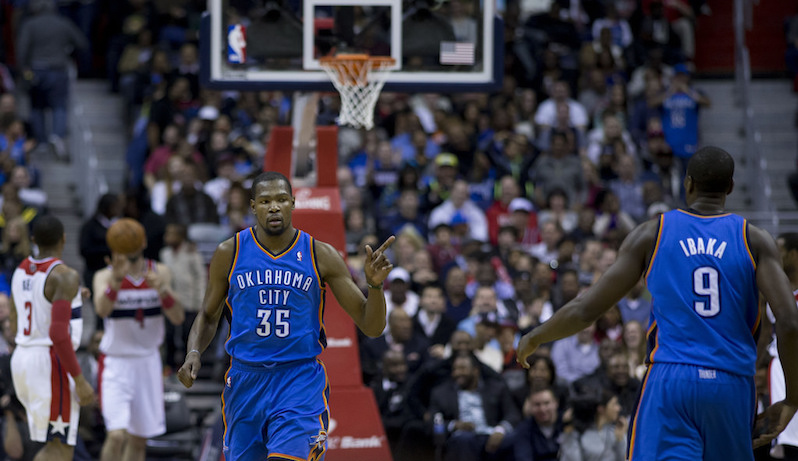 So long, Oklahoma City. Hello, Oakland. (Keith Allison / Flickr)
1
2
So long, Oklahoma City. Hello, Oakland. (Keith Allison / Flickr)
1
2
Not that this was the last NBA surprise.
In the new era of prosperity with the advent of the league’s mega-rich TV contract, whim is king. Stars have a long list of teams—they can choose which one will pay them $20 million.
Dwyane Wade turned down a two-year, $40 million deal in Miami, where he had played his entire career, for a two-year, $47 million deal with the Chicago Bulls, who looked lost even before unloading Derrick Rose, Pau Gasol and Joakim Noah.
Wade—who took less, if only $1 million or $2 million less, to enable the Heat to make moves like signing LeBron and Chris Bosh in 2010—had never been the highest-paid Heat player and felt disrespected.
Heat president Pat Riley, an authoritarian figure used to drawing lines in the sand, never moved off this one.
The aftermath, as described by the Miami Herald’s Dan Le Batard, looks like one of those Shakespeare plays with bodies strewn all over the stage.
“Dwyane Wade’s wife feels betrayed. Her stunned husband, Miami’s favorite son, finds himself somewhere between hurting and haunted. And warrior legend Pat Riley is wounded, having morphed with his fan base from The Godfather to Tony Montana in a way that feels reckless and bloody. Something so big and strong exploded at the center of what used to be their basketball family, and now they all limp away from each other with the scars.”
Then, of course, there’s Dwight Howard, who is to free agents what Moby Dick was to whales.
Howard opted out of his final season at $23.3 million in Houston (where the Rockets at least made the playoffs annually) to take $23.5 million annually in a three-year deal in Atlanta (where the Hawks are easing into rebuilding mode and traded point guard Jeff Teague).
Where whim is concerned, Dwight is the best there is.
He didn’t like playing with James Harden, after taking $20 million less than the Los Angeles Lakers offered because he didn’t like playing with Kobe Bryant.
Before that, Dwight left Orlando, where he didn’t have to play with any superstars but missed the playoffs in his final two seasons as an upcoming free agent. During that time, he asked to be traded to Brooklyn, changed his mind and waived his opt-out clause, committing himself to the Magic for another season. Then, he changed his mind back and said he wanted out again.
Loath to endure a third season of this nonsense, the Magic traded Dwight to the Lakers, who thought he would fall in line with the great centers they nabbed from other teams: Wilt Chamberlain to Kareem Abdul-Jabbar to Shaquille O’Neal.
Unfortunately for the Lakers, aside from not digging Bryant, Howard had a thing about O’Neal, a former Magic center and longtime critic of Dwight. Anything Shaq had done, Dwight didn’t want to be seen as following in his footsteps.
If Howard still doesn’t know what he wants as opposed to what he doesn’t want, Atlanta, home of the Hawks, is at least his home too.
Unfortunately—a word that comes up often in the Dwight Saga—as soon as he signed, Al Horford, the franchise centerpiece, took off to the Boston Celtics.
Not that whim is solely a star player’s prerogative. With network money continually rising, NBA owners are in the same win-win position that leads doofuses like the Sacramento King’s Vivek Ranadive to go through a coach or two per season without courting financial ruin.
Cleveland’s Dan Gilbert just went through three coaches in three seasons—including Mike Brown, whom he had already hired and fired once before—and won a championship in June.
Of course, with whim now seemingly at play in our national politics, too, we had—heaven help us—better get used to the idea.
Your support is crucial…
SUPPORT TRUTHDIG
With an uncertain future and a new administration casting doubt on press freedoms, the danger is clear: The truth is at risk.
Now is the time to give. Your tax-deductible support allows us to dig deeper, delivering fearless investigative reporting and analysis that exposes what’s really happening — without compromise.
Stand with our courageous journalists. Donate today to protect a free press, uphold democracy and unearth untold stories.
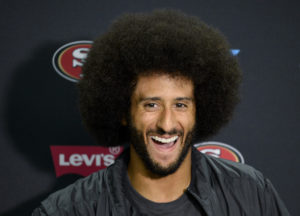
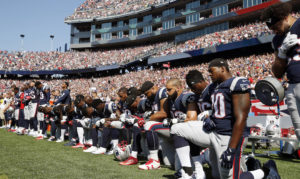
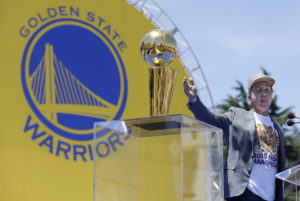
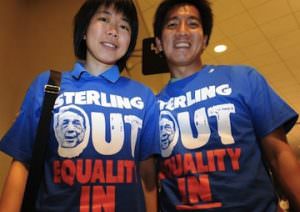

You need to be a supporter to comment.
There are currently no responses to this article.
Be the first to respond.